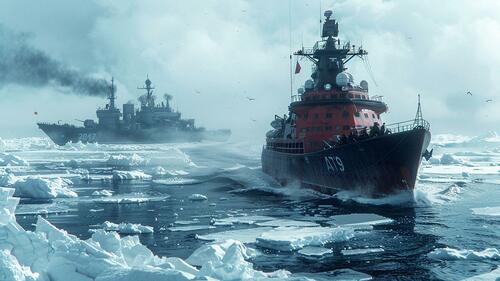It's "Heating Up" In The Arctic?
In the same week that Biden said he would not seek reelection, Russian and Chinese bombers were escorted out of the Alaskan Air Defense Identification Zone (ADIZ). Russia and China acting so boldly near American soil is an unprecedented move that signals the rising tensions of recent years. As Russia and China’s aggression has grown, and America’s global presence has, for better or for worse, dwindled militarily, The most obvious geographical connection between them has become an almost undiscussed point of tension. Secondhand wars in Ukraine and Israel have become central cultural themes and present many more active events to discuss. While the tensions in the north have massive repercussions, they produce very little news or new material. All one must do to put this tension into context is look at a globe from a perspective that looks down towards the North Pole. Russia, China, And America are concerningly close, especially considering their outsized influence and uneasy relationships.
Russia and China are eager to control the Arctic so they can transport goods without fear of American intervention. LNG (Liquid Natural Gas) and other natural resource transportation has been the biggest motivation for Russian Arctic shipping. Shipping itself is still relatively primitive in the Arctic, as Russia lacks developed satellite infrastructure. The cost-cutting potential of the northern routes can powerfully benefit Russia and China, as they would no longer have to take the long journey through South America. The current lack of ownership makes the Arctic appealing to any country that has even a small claim. The American government hopes that it stays neutral, and will act with force to ensure that.
A recent DoD report took an uncompromising stance that America would be ready for whatever shenanigans other countries chose to pull. Deputy Assistant Secretary for Arctic & Global Resilience Iris Ferguson said “This strategy is very action-oriented, which distinguishes it from previous Arctic Strategies.” The Arctic’s days on the back burner are coming to a close, and the US does not want to be playing catch up. The DOD will adopt a “monitor-and-respond” technique to make sure that nothing of significance happens in the Arctic without some American knowledge. They will begin more seriously looking into our strategic needs in the north and finding effective ways to secure them before Russia or China can finish their unrelenting march for northern domination. This recent activation of interest in the Arctic has arisen from a recognition of both Russia and China’s boldness, as well as the fact that the Arctic has less ice than it used to, allowing more human activity.
Russia has shown that no matter how involved it is with wars in other parts of the world, the Arctic will remain a priority. It demonstrated this by ramping up activity in the Arctic even as it invaded Ukraine. To avoid sanctions, Russia created a shadow fleet to export oil through the north. Their ships are able to avoid Western influence by going far above the UK and entering the Atlantic. The North provides the promise of freedom and an unrestricted gateway to the rest of the world, so it is not surprising that its recent imperialist efforts have resulted in more activity. Russia was recently booted from the council of 8 nations that border the Arctic. While necessary, this move could empower Russia to act even more boldly, knowing it is not bound to act with respect towards other nations in the north.
China has shown its interest by creating a new role for itself as a “Near-Arctic State.” This title is meaningfully ambiguous, so China can step into whatever capabilities it thinks the West will let it. The term comes from the fact that China’s ecosystem is greatly affected by the ecosystem of the Arctic, but China’s involvement has little to do with the environment. PRC has been using the North as more of an economic and military investment. They have used the term “Polar Silk Road” to try to leverage more legitimacy for their own use of the Arctic. China has encouraged non-polar nations to take advantage of the Arctic as a way of gaining legitimacy for its own future use. It has a fleet of icebreakers that it has not been afraid to use in recent years. China has also created much infrastructure, hoping to increase its northern operations. The Arctic seems to mirror China’s operations in the South China Sea just a few years ago. If the West is not prepared, Russia and China will style themselves as the sole rulers of the North.
Get Peter Schiff’s key gold headlines in your inbox every week – click here – for a free subscription to his exclusive weekly email updates.
